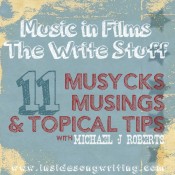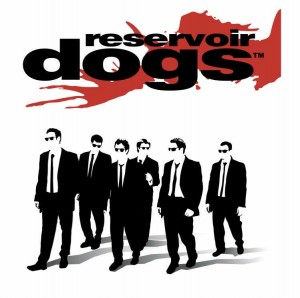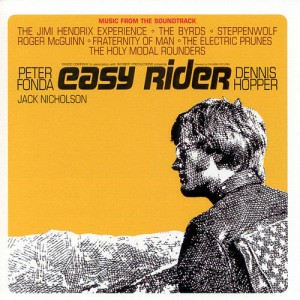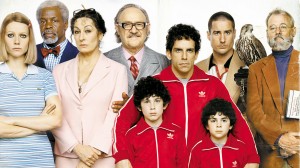Musycks Musings & Topical Tips 11: Music in Films – The Write Stuff

Music in Films – The Write Stuff
A weekly column by Inside Songwriting contributor, Michael J Roberts.
Music is a crucial accompaniment for every aspect of modern life, for many of us an inseparable feature that connects and evokes places, people and memories. Many of us find the perfect song to express how we feel at any given time – we nominate songs for weddings, funerals and all events in between to help enrich our human rituals. Small wonder then, that a crucial feature for many modern films is the placing of the right song for the right scene. Great directors have an intuitive knack for getting their song choice right, and given the amazing range of choice these days, that’s no small feat. In this weeks instalment I want to look at 4 great and different directors who understand the art and are adept at using music in film.
In the modern era the game changing film was Easy Rider, in 1969, prior to that record companies and film companies were mostly at odds in finding a formula that would allow the use of different chart hits or pre-existing recordings from different owners to be used on the one film soundtrack. Prior to this music soundtracks were mostly made up of songs written specifically for a film, like A Hard Day’s Night for which Lennon and McCartney wrote new songs or Mike Nichol’s The Graduate, in which Paul Simon turned his demo song Mrs Roosevelt, into Mrs Robinson (and Columbia also licensed a couple of Simon and Garfunkel ‘oldies’ like Sounds of Silence) and produced a hit soundtrack.
Once the idea of licensing was solved it became apparent that any pop songs could be slotted in to enrich the viewing experience and some films even made a feature of the songs, as with Lawrence Kasdan’s The Big Chill, where the Motown heavy soundtrack produced a massive selling album. After Easy Rider finding the right song for the right scene became an art form.
The Master – Martin Scorsese
One who embraced this new challenge was Martin Scorsese, a life-long massive music fan, who understood the importance of matching songs for the needs of his films. Marty has proved to be the most masterful of all his generation in terms of using music to its full extent. He worked on Woodstock as a young filmmaker, and his early films like Taxi Driver could feature a killer score from masters like Bernard Herrmann and a great song like Jackson Browne’s Late For The Sky and work effectively side by side. Scorsese marked himself as the master of the hip soundtrack, often on league with Robbie Robertson of The Band, a friend and collaborator in choosing soundtrack songs, and films like Raging Bull, After Hours, Goodfellas and Casino have vibrant and interesting period songs.
Scorsese could pair a Peggy Lee ballad with a punk rock tune from Bad Brains, and add Chelsea Morning from Joni Mitchell as he did in After Hours, roaming freely and with authority across pop music from the 1940’s to the ‘80s. He used Peter Gabriel to supply the evocative soundtrack for his The Last Temptation of Christ, and loaded up his pool hall homage The Colour of Money with a full blooded Blues menu of B.B. King, Willie Dixon and Eric Clapton. Perhaps Marty’s most sustained and quixotic use of songs in film is found in Casino from 1995, ranging from Muddy Waters’ Hoochy Coochy Man to Devo’s version of Satisfaction, from Dean Martin to Cream.
Scorsese continues to prove he’s a master of the form as his most recent entry, the energetic and compelling The Wolf Of Wall Street attests to, where he draws a seamless musical line between Elmore James and Billy Joel, and does it with style and wit. 
No greater evidence for Marty’s love of music need be affirmed after considering he has given us marvellous and definitive documentaries on Bob Dylan and George Harrison, fine in-concert features on The Band (The Last Waltz) and The Rolling Stones (Shine a Light) as well as a landmark series on American music called The Blues. He is currently working on a documentary series on Rock and Roll for HBO! Whew.
Enfante Terrible-tino
A modern filmmaker who has made an art form out of quirky soundtrack choice is the iconoclast par excellence, Quentin Tarantino. Tarantino burst on to the scene with his vibrant and edgy Reservoir Dogs and the songs he used played a big part in making the film work so well, who could forget his use of Stuck in the Middle with You by Stealers Wheel! Quentin got us tapping our toes and then emptied the contents of our stomachs. Like The Big Chill Quentin unearthed some forgotten gems to illuminate the claustrophobic heist feature, cheesy ‘70s hits like Little Green Bag took on new dimensions, as did Nilsson’s wonderful earworm Coconut. All of Tarantino’s films have featured brilliant soundtrack choices, his sophomore film Pulp Fiction even resurrected surf music via Dick Dale’s astonishing Misirlou. Tarantino has consistently made a feature of his eclectic song choice, never predictable and never dull, and able to chose the well known or obscure with equal aplomb. He keeps his audience guessing by being able to play against the mood of a scene, as with the novelty song Flowers On The Wall, a backdrop to murderous intent and gut churning tension.
Tarantino followed up with Jackie Brown, a caper flick stuffed full of superb soul gems by Bobby Womack, Bill Withers and The Delphonics, side by side with a Johnny Cash ballad. Tarantino made the Kill Bill cycle next, maddeningly eclectic in terms of soundtrack and song, and showed the full extent of his exploitation fetishes with Death Proof and Django Unchained, a fertile ground for his musical spaghetti western fixation. Tarantino’s taste and style in music suggests he will continue to make interesting and quirky choices that will make his films even more dimensional and enjoyable.
The Anderson Tapes – Paul Thomas and Wes
Paul Thomas Anderson has been responsible for some of the most memorable uses of songs in movies. He made a mark with his sweetly satiric take on the porn industry, Boogie Nights, in the late ‘90s, where he reheated such pop-rock gems as Jessie’s Girl from Rick Springfield (in an astonishing scene with Alfred Molina) and the masterful Lonely Boy by Andrew Gold. The talented musician and songwriter Michael Penn advised and one feels his influence in the choices of the Sniff ‘n’ The Tears hit Driver’s Seat and in the superb Walter Egan song Magnet and Steel.
P. T. Anderson followed with the brilliant Magnolia, where he constructed a multi-layered film around the songs of Aimee Mann (Mrs Michael Penn) taking some of her work as a starting point to deliver a stunning reverie on life, familial relationships and grief. It contains one of the most effective uses of a song in modern cinema when he has several of his main characters sing along to Aimee’s beautiful Wise Up, in a complex and devastating sequence that culminates in a rain of frogs! He has since concentrated on period films where the scope for modern songs is limited but he continued to show his élan with music choice by commissioning Radiohead’s Johnny Greenwood to score There Will Be Blood and he pulled a couple of lovely tunes for The Master, featuring great singers like Ella Fitzgerald and Jo Stafford.
Wes Anderson made his debut feature Bottle Rocket in 1996 with Mark Mothersbaugh from Devo as his composer. The pair has since made a signature of providing quirky and illuminating choices in regards to songs working hand in glove with the films. Rushmore set the tone with its British Invasion flavoured band tunes spicing up a preppy students struggle with identity and expectation, using well known bands like The Kinks and The Faces but also smaller gems like Concrete and Clay by Unit 4+2 and Here Comes My Baby by Cat Stevens. John Lennon’s glorious ode to his wife Oh Yoko! gets a run as does A Summer Song by Chad and Jeremy.
Anderson constructed a brilliant soundtrack with his masterpiece The Royal Tenenbaums, a superb meditation on family and phobia. The song list is astonishingly varied but a roster of the artist used gives a hint of the flavour, Bob Dylan, Nick Drake, The Ramones, Van Morison, John Lennon, The Rolling Stones, et al. Wes uses Nico’s offbeat reading of Jackson Browne’s masterpiece These Days as a key song and Paul Simon’s Me and Julio Down by the Schoolyard for good measure. The under-used Emmit Rhodes finds a place with Lullaby, as well as the ill-starred genius of Elliot Smith with Needle in the Hay. One of the great soundtracks in modern film.
Wes Anderson followed up with the quirk The Life Aquatic, which featured zany Brazilian flavoured interpretations of David Bowie songs like Starman and Rebel Rebel. The Zombies, Scott Walker and The stooges round out another eclectic-to-a-fault collection that always sparkles and delights. The Darjeeling Limited continued to show his Brit era fetish with more Kinks and Stones accompanying a filial rail journey on the sub-continent but he has since moved away from his regular formula with his later films Moonrise Kingdom and The Grand Budapest Hotel, where a more traditional soundtrack approach proved to be most effective.
I know that song!
One of the great ways for young songwriters to connect with the music of the past is via the soundtracks to new feature films. Many films provide unique opportunities for different generations to connect with the music of the past, I’m often surprised by my daughters generations knowledge of older songs, and often when I enquire “how do know that song”, it’s “I heard it in such and such a film”. It’s worth acknowledging the modern directors that have made an art form out of picking the right song for the right scene – look at The Coen Brother’s The Big Lebowski, or the fact that they kick started an entire genre again with O Brother Where Art Thou? It’s a crucial component in making the viewers experience enjoyable and the film effective and a great way for us to continue to value and cherish great songs.
Happy viewing and listening
Musycks
FURTHER READING:
http://www.filmycks.com/directors-suite/paul-thomas-anderson/
http://www.filmycks.com/directors-suite/martin-scorsese/
http://www.filmycks.com/directors-suite/quentin-tarantino/
http://www.filmycks.com/films/the-royal-tenenbaums/
RELATED POSTS / LINKS:
Musycks Musings & Topical Tips Home




